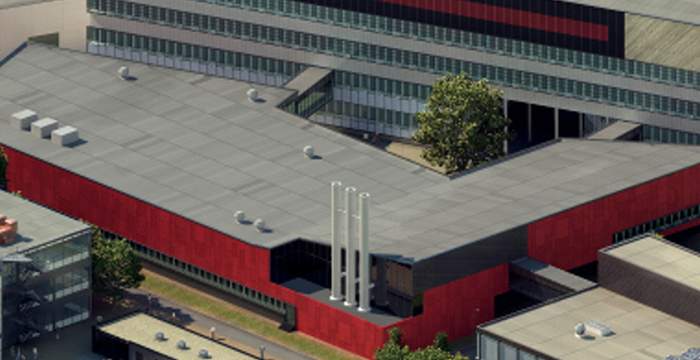Henk-Willem Veltkamp is the head of the etch cluster at the MESA+ Institute for Nanotechnology. He is involved in all the dry etch capabilities within MESA+, being plasma etching (RIE, ICP-RIE, Bosch/mixed-gas/cry DRIE), vapour-phase etching (HF and XeF2), ion beam etching (IBE, RIBE), and atomic layer etching. Furthermore, he is responsible for the education of new users and assists users in process flow development.
Background information
Henk-Willem Veltkamp was born on the 12th of October, 1989 in Zwolle, the Netherlands. Already while doing his primary and secondary education, he became interested in the beta-courses (natural sciences, biology, engineering). After his secondary education, he started in 2007 with a four-year bachelor’s degree in Chemistry at the Saxion University of Applied Sciences in Deventer, the Netherlands. Here, he focused on analytical chemistry, microfluidics, and microfabrication technology. His passion for the last two topics was boosted in the last year of the bachelor’s program. During his bachelor’s internship in the Mesoscale Chemical Systems department of the MESA+ Institute for Nanotechnology of the University of Twente (Enschede, the Netherlands) he investigated a chemical bonding method between glass and fluorinated ethylene propylene foil, which could be used to fabricate microvalves and -pumps. During his bachelor’s thesis at LioniX B.V. in Enschede, the Netherlands, he worked on the integration of an opto-fluidic chip for absorption measurements with a microreactor system.
In 2011, he started with a one-year pre-master Applied Physics program at the University of Twente. After successfully finishing this, he decided to start with the master’s program Nanotechnology in 2012 at the same university. During his master’s degree, Henk-Willem focused on micro- and nanofluidics, lab-on-a-chip devices, micro- and nanofabrication technologies, and nanomedicine. During his laboratory practical course, he constructed a process to fabricate wire-frame nano-pyramids with entrance holes of 200nm, which in the end resulted in two publications. For his master’s thesis, Henk-Willem investigated a micro solid-phase extraction chip to isolate and purify DNA. During this period, he was involved in other projects as well, which resulted in several publications. Besides studying, he was active in the Twente Academy as a supervisor in organic chemistry practical courses for secondary school students.
After finishing his master’s degree, he moved to Brussels, Belgium, and worked one year as a researcher in a collaboration project between the Vrije Universiteit Brussel (department of "Chemische Ingenieurstechnieken en Industriële Scheikunde") and the University of Twente (department of Mesoscale Chemical Systems) on high aspect ratio hot embossing. In his spare time, he developed COMSOL Multiphysics skills and assisted people in performing simulations. A couple of these simulations led to publications. After finishing this contract, he moved back to the University of Twente, where he became education coordinator E-learning and blended learning for the faculty of Science and Technology. During this contract, he orientated himself on finding a Ph.D. position.
In 2016, he started his Ph.D. in, what was back then, the Micro Sensors and Systems department of the MESA+ Institute for Nanotechnology on the miniaturization of the Wobbe index meter. In 2018, this group merged together with the Semiconductor Components department and formed the Integrated Devices and Systems department. During his Ph.D., Henk-Willem successfully co-organized several conferences, i.e., the 10th International Nanoscience Student Conference (INASCON) in 2016, and the 3rd and 4th Microfluidic Handling Systems conferences (MFHS) in 2017 and 2019, respectively.
His passion for science even made him decide to become a blood donor for scientific research. During his project, countless tubes of blood were taken from him, which contributed to all sorts of research, but mainly cancer cell detection topics.
Next to his work, Henk-Willem is secretary of the Dutch Orders and Medals Research Society (Studiekring Ridderorden en Onderscheidingen, SRO) and a longtime member and first responder of the Dutch Red Cross. The last also resulted in participation in the emergency response team of the University of Twente (Waaier team and Carré/NanoLab team).
Expertise
Engineering
- Side Wall
- Microfluidic Channel
- Surfaces
- Applications
- Sensor
- Silicon
- Fabrication Method
Physics
- Fabrication
Organisations
Publications
Jump to: 2025 | 2024 | 2023 | 2022 | 2021
2025
2024
2023
2022
2021
Other contributions
Research profiles
- 2002-2007: Havo level secondary education at Noordgouw, Heerde (ISCED 2+3)
- 2007-2011: B.Sc. Chemistry at Saxion University of Applied Sciences, Deventer (ISCED 6)
- 2011-2012: Pre-M.Sc. program Nanotechnology/Applied Physics at University of Twente, Enschede (ISCED 6)
- 2012-2014: M.Sc. Nanotechnology, University of Twente, Enschede (ISCED 7)
- 2016-2020: Ph.D. training, University of Twente, Enschede (ISCED 8)
Affiliated study programs
Current projects
Integrated Wobbe Index Meter
STW project 13952
In the press
- https://www.coleparmer.com/blog/2015/10/15/transporting-reagents-with-a-pipette-and-tygon-tubing/
Address

University of Twente
Nanolab (building no. 16), room 1002A
Hallenweg 23
7522 NH Enschede
Netherlands
University of Twente
Nanolab 1002A
P.O. Box 217
7500 AE Enschede
Netherlands